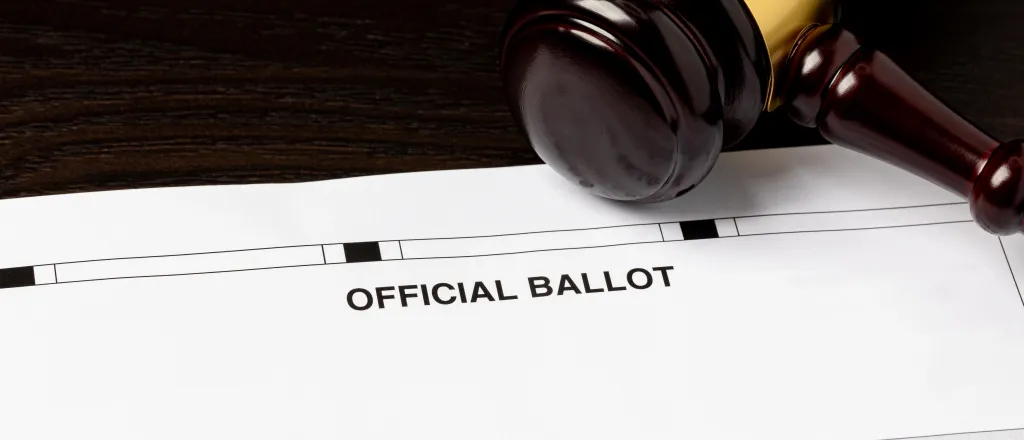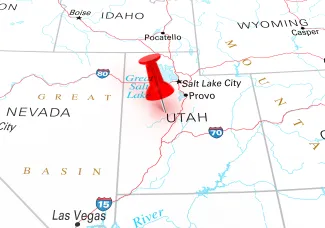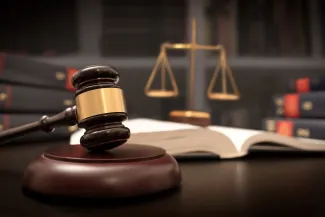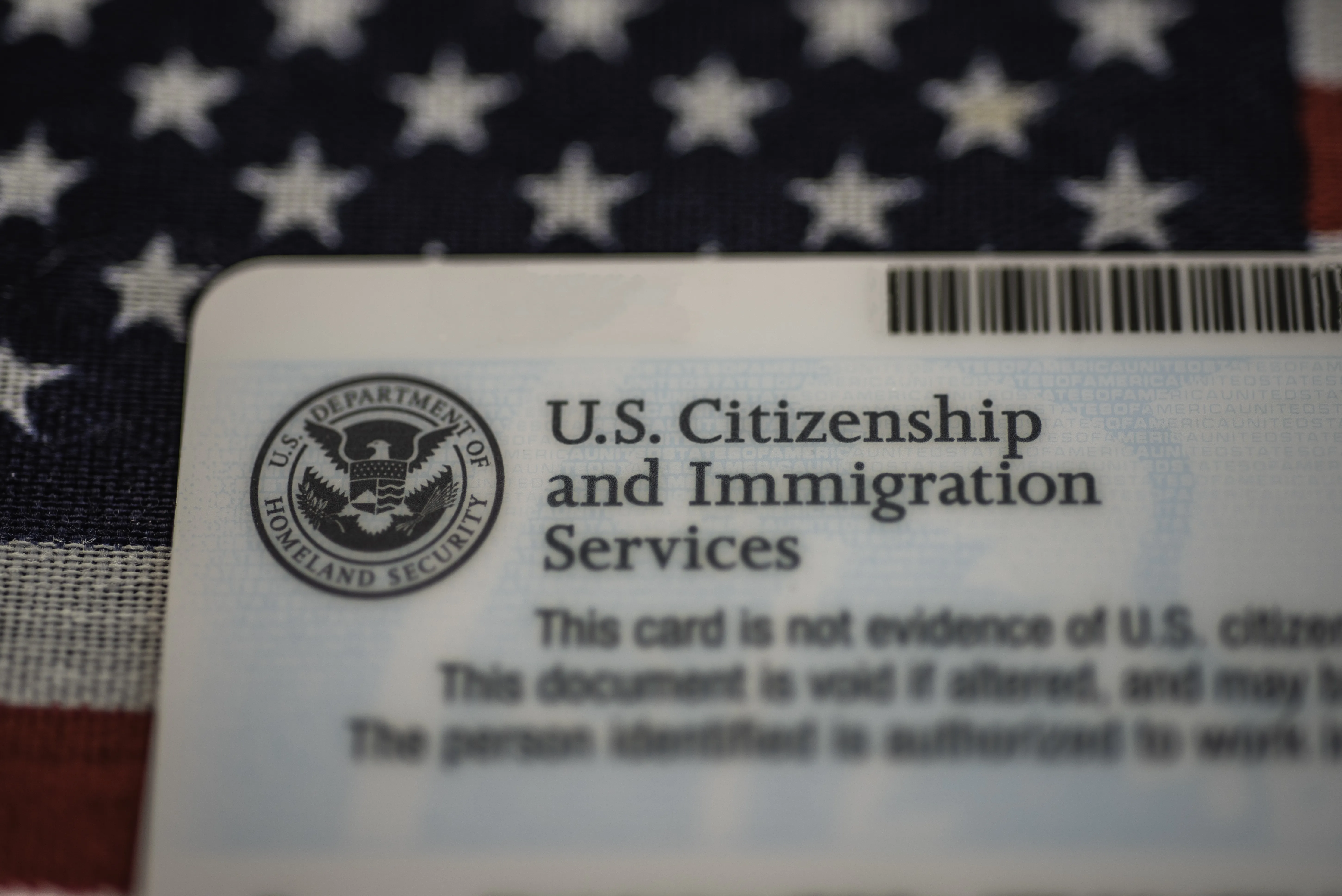
Utah judge faces impeachment threats after ordering congressional map with 1 Democratic seat
© JJ Gouin - iStock-2074087177
A Utah judge’s late-night court order Monday sparked celebration from anti-gerrymandering groups and Democrats, striking down the Republican-controlled Utah Legislature’s congressional map and replacing it with one that would include a single Democratic-leaning district and three Republican-leaning districts.
But Utah’s redistricting battle is far from over — and it may boil over into an even uglier clash with the state’s judiciary.
Barely 20 minutes after 3rd District Judge Dianna Gibson’s order was released, with her decision going public shortly before midnight, a GOP Utah lawmaker announced on social media that he would launch an effort to remove her from the bench.

“I have opened a bill to file articles of impeachment against Judge Gibson for gross abuse of power, violating the separation of powers and failing to uphold her oath of office to the Utah Constitution,” Representative Matt MacPherson, R-West Valley City, posted on X.
Under Utah law, elected officials and judges can only be impeached for “high crimes and misdemeanors or malfeasance in office.” Any impeachment proceedings would be required to start in the House.
Gibson was appointed in 2018 by then-Governor Gary Herbert, a Republican, and confirmed unanimously by the GOP-supermajority Utah Senate. At the time, on the Senate floor, Senator Todd Weiler — chair of the Senate Judicial Confirmation Committee — quipped lightheartedly that he was told “by one of the smarter attorneys I know (that) ‘if we didn’t confirm her we were all a bunch of idiots,’” and he said he agreed.
It’s too soon to say whether MacPherson’s effort will gain enough traction to survive both the House and Senate — but what was clear Tuesday was the Utah Republican Party and its member legislators were furious with Gibson’s order, accusing her of violating the Utah Constitution, which they continue to argue clearly requires the Legislature to carry out redistricting duties.
Utah’s top Republican legislative leaders — Senate President Stuart Adams, R-Layton, and House Speaker Mike Schultz — didn’t go so far as to directly promise impeachment proceedings, but they issued a joint statement strongly condemning Gibson’s ruling.
“Late last night, a single unelected judge set aside the Utah Constitution and the voice of Utah voters, selecting a map drawn behind closed doors by out-of-state advocacy groups,” Adams and Schultz said. “The process the judge chose denied the people of Utah a chance to see it, to weigh in, or to be heard. The judge disregarded the Constitution to select a clearly gerrymandered map. This is not fair to Utahns and is deeply disappointing.”
While they argue the map drawn by plaintiffs and chosen by the court was “clearly gerrymandered” to favor Democrats, Gibson in her order concluded from more than 1,000 pages of evidence and hours of public expert testimony that the Legislature’s map “is an extreme partisan outlier — more Republican than over 99 percent of expected maps drawn without political consideration.”
Statement on Judge Gibson’s Activist Map Decision#utgop #utpolpic.twitter.com/2pfKnjE96a
— UtahGOP (@UtahGOP) November 11, 2025
She also concluded that lawmakers’ retained expert drew the map with “partisan political data on display” in violation of a voter-approved law meant to protect against gerrymandering.
Schultz and Adams, however, argued “this isn’t how government should work.”

© Vadym Ivanchenko - iStock-1483193368
“Our system depends on transparency, accountability, and respect for the roles defined in our Constitution,” they said. “Judges are meant to uphold the law as written, not rewrite it to serve political ends. Nothing in Utah’s Constitution gives the courts authority to impose maps designed by private groups.”
Redistricting, they added, “is not a courtroom exercise; it is a constitutional duty entrusted to the Legislature, the body directly elected and accountable to Utahns. When that process is overridden, it weakens the voice of every Utahn.”
“Utahns deserve leaders who will defend their voice, their Constitution, and the balance of powers that make our system work,” they added. “This moment calls for unity and resolve, to stand together, but firmly, in defense of the principles that make Utah strong and the Republic process we all depend on.”
Utah Governor Spencer Cox, a Republican, also issued a statement saying he disagrees with Gibson’s ruling and supports efforts to appeal it. His statement, however, didn’t go so far as to say he supports impeachment efforts, and the governor’s office didn’t immediately respond to a request clarifying his stance.
“The Utah Constitution clearly states that it is the responsibility of the Legislature to divide the state into congressional districts. While I respect the Court’s role in our system, no judge, and certainly no advocacy group, can usurp that constitutional authority,” Cox said. “For this reason, I fully support the Legislature appealing the Court’s decision.”
Did the judge violate the constitution? No, she’s following it, plaintiffs say
Gibson’s ruling was largely based on a unanimous decision last year by the Utah Supreme Court that determined the Utah Legislature does not have unfettered power when it comes to changing “government reform” ballot initiatives.
That ruling sent a yearslong anti-gerrymandering lawsuit against the state back to Gibson’s courtroom, with all five of the Utah Supreme Court’s justices ruling she “erred” when she initially dismissed the claim that Utah lawmakers had violated Utahns’ rights to alter and reform their government through a ballot initiative known as Proposition 4.
That initiative, narrowly approved by voters in 2018, created an independent redistricting process meant to guard against partisan gerrymandering.

Gibson’s Monday decision capped off a court-ordered process to “remedy” the state’s 2021 congressional map, which she voided as a result of an “unconstitutional process” after she ruled in August that Utah lawmakers overstepped when they undid Proposition 4.
While multiple GOP legislators have accused Gibson of being an “activist judge” who is ignoring the Utah Constitution, the plaintiffs in the redistricting lawsuit say those claims ignore the Utah Supreme Court’s legal precedent and attack Gibson without any basis.
“Today is a day we should all be celebrating the vindication of the voters of Utah and the courage that courts show in the face of enormous political pressure,” said the plaintiffs’ attorney, David Reymann, during a news conference on the steps of the 3rd District Courthouse in Salt Lake City Tuesday morning.
“The whole reason the court was put in this position to try and put a new map in place is because the Legislature failed to do its job and enact a legally compliant map,” Reymann said. “Courts don’t do this by default. They do it when the Legislature doesn’t do its job.”
Reymann said threats to impeach Gibson are “irresponsible and unfortunate,” adding that he hopes “they are merely the initial throes of disappointment” from lawmakers who are frustrated that they lost in court “and not something they would actually pursue as a form of political reprisal, because that would be damaging.”
To accusations that Gibson is violating the Utah Constitution, Reymann said lawmakers have “just been proven repeatedly wrong about that.”
“The court’s role is to interpret the Constitution and decide whether what the Legislature has done complies with it,” he said. “Just because they disagree with what she has ruled does not mean that she has violated the Constitution.”
David Reymann, attorney for the plaintiffs who sued the Utah Legislature over their congressional maps, speaks at a press conference outside the Third District Courthouse in Salt Lake City on Tuesday, Nov. 11, 2025. Late the night before, 3rd District Judge Dianna Gibson ruled in favor of the plaintiffs, choosing their submitted map to be used in the 2026 elections. (Photo by Spenser Heaps for Utah News Dispatch)
What happens when the Legislature and judiciary clash?
Acknowledging that the courts rarely issue statements in the political arena — and that Gibson is not likely to publicly defend herself — Reymann, speaking for himself as a lawyer and not on behalf of the plaintiffs, said that if lawmakers pursue impeachment, Utah attorneys and other legal professionals would likely rise up in fervent opposition.
“The Utah legal community as a whole, political stripes aside, is very protective of the independence of the judiciary. And if there is really an effort to retaliate against Judge Gibson, I think that the legal community as a whole will stand up and defend her full-throatedly,” he said. “And they should.”
“She is an unbelievably respected judge in the community,” he added of Gibson. “She has done a fantastic job in this case, whether you agree with her decision or not. She has done the role that the Constitution committed to her, and to suggest that she should be removed from office just because you don’t like politically the result that she has reached, I think is highly irresponsible.”

© legacyimagesphotography - iStock-160735792
Impeachments of judges are rare, but Utah wouldn’t be the first state to see an impeachment effort stemming from a redistricting ruling. In 2023, Wisconsin Republican lawmakers threatened to impeach a liberal Supreme Court Justice judge if she didn’t recuse herself from weighing in on a lawsuit over the state’s legislative maps, but they later backed offafter a former justice advised them nothing she had done had risen to the level of corrupt conduct in office.
President Donald Trump has also called for impeaching judges who have ruled against his administration. In 2018, U.S. Supreme Court Chief Justice John Roberts issued a rare statement pushing back against the president.
“For more than two centuries, it has been established that impeachment is not an appropriate response to disagreement concerning a judicial decision. The normal appellate review process exists for that purpose,” Roberts said at the time, according to Politico.
A spokesperson for the Utah courts did not immediately respond to a request for comment Tuesday.
The Utah State Bar issued a statement saying it “strongly condemns any effort to impeach (Gibson) based on her recent ruling.”
“Judges are charged with applying the law to the facts of their cases without regard to politics or public opinion. Using impeachment as retaliation for an unfavorable decision undermines the rule of law and the separation of powers that safeguard our system of government,” the Bar said.
The Bar urged “all public officials and Utahns to respect the role of the judiciary and the independence of Utah’s courts.”
“The judiciary must remain free from political pressure so all Utahns can have confidence in fair, impartial courts,” the Bar continued. “Impeachment is reserved for serious misconduct, and disagreement should instead be addressed through the appeals process.”
Utah’s top Republican legislative leaders, Schultz and Adams, did not immediately respond to a question sent to their offices asking whether they were supportive of the effort to impeach Gibson.
Utah’s top Republican legislative leaders, Schultz and Adams, also did not immediately respond to a question sent to their offices asking whether they were supportive of the effort to impeach Gibson.
It also wouldn’t be the first time the Utah Legislature has clashed with the Utah judiciary. Earlier this year during lawmakers’ 2025 general session, lawmakers proposed a suite of bills that legal professionals decried as attacks on the judiciary’s independence.
Many of those bills later fizzled after Utah Chief Justice Matthew Durrant met privately with legislative leaders, but lawmakers did pass a bill stripping the Utah Supreme Court of its ability to choose its own chief justice and instead granting that power to the governor and the Senate.
Governor Spencer Cox, a Republican, later vetoed that bill — but after striking a deal with lawmakers, they revived it while limiting the state’s next chief justice’s term to one, eight-year term.
Pressure on lieutenant governor to not comply
Shortly after the Monday night ruling, Lt. Governor Deidre Henderson posted on X that she would “comply with Judge Gibson’s order and immediately begin the process of implementing” the plaintiffs’ alternative map that the court ruled should be used for the 2026 elections instead of the Legislature’s map “unless otherwise ordered by an appeals court.”
“There will likely be an emergency appeal,” Henderson said in another statement posted Tuesday morning, “but the process of finalizing new boundary details will take weeks of meticulous work on the part of state and county officials. Barring an appellate court ruling, we must begin without delay to ensure that everything is in place for candidate filing in January.”
There will likely be an emergency appeal, but the process of finalizing new boundary details will take weeks of meticulous work on the part of state and county officials. Barring an appellate court ruling, we must begin without delay to ensure that everything is in place for… pic.twitter.com/R5wZjCmiNh
— Lt. Governor Deidre M. Henderson (@LGHendersonUtah) November 11, 2025
“The people of Utah deserve an orderly and fair election,” Henderson continued, “and we will do everything in our power to administer one.”
Henderson’s statement quickly sparked anger from conservative voices online, including from MacPherson, who repliedto her post by writing: “Maybe sleep on this before making irrational, unconstitutional decisions. Remember your oath as well.”
Utah’s Republican legislative leaders have indicated that they intend to continue fighting in court, with appeals to the Utah Supreme Court and the U.S. Supreme Court if necessary.

© Delpixart - iStock-607610082
“The question that nobody knows this morning is whether they are going to try to prevent the map that the judge ordered to be put in place and the lieutenant governor said would be put in place … whether they will seek to disrupt that process,” Reymann said.
But because the lieutenant governor’s office, which oversees the state’s elections, told the court Nov. 10 would be the latest possible date to set congressional boundaries for next year’s elections, it doesn’t appear likely that an appeal could successfully reverse Gibson’s decision in time for 2026. But that remains to be seen.
The 2028 elections, however, are a different matter. While the Legislature continues to fight in court, the Utah Republican Party and the group Utahns for Representative Government are also pursuing another ballot initiative to repeal Proposition 4.
To qualify the repeal question for the 2026 ballot, the group will need to collect at least 140,748 valid signatures from registered voters across Utah while meeting specific thresholds in at least 26 of Utah’s 29 Senate districts.
That effort is currently underway.
Elizabeth Rasmussen, executive director of Better Boundaries, the anti-gerrymandering group that successfully pursued Proposition 4 via ballot initiative eight years ago, said “we’re confident” that Utah voters will reject the effort to repeal.
“We trust the voters of Utah, that they will choose fairness,” she said. “Of course, we have a fight ahead of us for next year. But right now, today, at least, we’re just celebrating this win.”

















